Bursting with health benefits, fisetin is an impressive flavonoid found in various fruits, vegetables, and nuts. Its antioxidant, anti-inflammatory, and neuroprotective capabilities have been widely explored to the delight of many researchers who have seen its positive effects on bodily function.
Some of the best food sources of fisetin can be found in strawberry, apple, persimmon, grape, onion, and cucumber. Furthermore, animal studies have demonstrated that fisetin can significantly boost testosterone levels and promote optimal health overall. By eating more foods with this nutrient and possibly adding a supplement to your daily routine, you could potentially experience the many advantages of this powerful compound.
What is Fisetin and Why Should I Include it in My Diet?
Fisetin is a potent flavonoid – an organic compound sourced from fruits and vegetables such as apples, persimmons, cucumbers, and grapes. Structurally similar to quercetin and kaempferol, fisetin has been lauded for its health benefits associated with potential aging-related ailments.
Fisetin is a highly beneficial substance that offers many advantages beyond nutrition:
- As an antioxidant, it can guard cells against the harm of free radicals; as an anti-inflammatory, it promotes decreased inflammation in the body;
- Its neuroprotective properties protect brain cells while also boosting cognitive function.
- What’s more, animal studies demonstrate that Fisetin has positive effects on testosterone levels - making it one supplement you should seriously consider adding to your diet!
Fisetin is at the forefront of research for its potential to aid in cancer, diabetes, and heart disease. Eating foods that are rich in fisetin can help you take advantage of these possible health advantages while possibly taking a supplement may also be an effective way to increase your intake of this crucial nutrient.
What Role Does it Play in Longevity?
Due to the promising findings from an investigation conducted by Paul D. Robbins and his team of scientists, which concluded that mice exposed to fisetin lived 10% longer with fewer age-related issues compared to those in the control group, even at a more mature age; this result motivated Mayo Clinic to initiate a clinical trial exploring direct effects of fisetin supplementation on humans undergoing aging difficulties.
 The eminent Dr. Maher, Ph.D., also uncovered remarkable findings concerning the impact of fisetin on the brain. Her experiments with mice showed that fisetin had neuroprotective and memory-boosting capacities in her research subjects, including those suffering from Huntington’s Disease (HD), a hereditary disorder that causes destruction of neurons within the mind.
The eminent Dr. Maher, Ph.D., also uncovered remarkable findings concerning the impact of fisetin on the brain. Her experiments with mice showed that fisetin had neuroprotective and memory-boosting capacities in her research subjects, including those suffering from Huntington’s Disease (HD), a hereditary disorder that causes destruction of neurons within the mind.
By providing mice with HD a diet supplemented by fisetin, the onset of motor defects was delayed and average life expectancy increased to an astonishing 30%.
This remarkable result is likely due to fisetin’s special properties, such as its senolytic ability, antioxidant capabilities and mimicry of calorie restriction.
What Foods Contain Fisetin and How Fisetin Benefit For People?
| Fruits | Description |
|---|---|
| Strawberries | Contains the highest levels of fisetin among fruits |
| Apples | Good source of fisetin, particularly in the skin |
| Persimmons | Contains moderate levels of fisetin |
| Grapes | This product contains a moderate amount of fisetin |
| Kiwi | There is a moderate concentration of fisetin in this product |
| Mango | Fisetin is moderately present in this product |
| Vegetables | Description |
|---|---|
| Onions | Good source of fisetin, particularly in the skin |
| Cucumbers | Contains moderate levels |
| Tomatoes | Contains moderate levels |
| Nuts & Seeds | Description |
|---|---|
| Pistachios | Good source |
| Flaxseeds | Good source |
Fisetin, a flavonoid found in many fruits, vegetables, and nuts can aid your body’s overall health. Incorporate these beneficial foods into your diet or take a fisetin supplement to experience the potential benefits for healthy aging, brain health, and testosterone levels it provides.
Benefits List:
- Improves brain health and memory
- Slows down aging
- May improve symptoms of depression
- Protects against stress and inflammation
- Shows anti-cancer abilities
- May protect against stroke and Alzheimer’s
Moreover, its antioxidant properties help guard against serious diseases like cancer, heart disease, and diabetes due to its anti-inflammatory abilities as well as neuroprotective effects.
Other Food Sources of Fisetin
Compared to other fruits and vegetables, strawberries contain an exceptionally high concentration of fisetin - much higher than the 100 mg contained in typical dietary supplements. This makes them a great source of this powerful antioxidant!
 Of course, there are supplemental brands available that have higher doses of fisetin than what is typically found in food sources; however, the effects of such large dosages remain to be seen. For those looking for more traditional options, lotus root and kiwi both contain minuscule amounts of fisetin as well as other beneficial vitamins and minerals like vitamins C, copper, and B vitamins.
Of course, there are supplemental brands available that have higher doses of fisetin than what is typically found in food sources; however, the effects of such large dosages remain to be seen. For those looking for more traditional options, lotus root and kiwi both contain minuscule amounts of fisetin as well as other beneficial vitamins and minerals like vitamins C, copper, and B vitamins.
Not only is this vegetable abundant in fiber and low in calories, kiwis are also enriched with 2 grams of fisetin as well as ample amounts of vitamin C and dietary fiber.
Mangoes and cucumbers are both known to contain a small amount of fisetin found in freeze-dried foods. However, the exact quantity of fisetin in these two fruits/vegetables largely depends on how they were grown - whether indoors or outdoors, temperature and other environmental factors can significantly influence the presence of this powerful antioxidant.
How Fisetin May Help to Stop Cells Becoming Senolytic
An exhilarating, new supplement that can boost your overall health and well-being is now available! Studies have revealed that this powerful ingredient may possess senolytic properties, essentially stopping your cells from becoming senescent. By preventing the accumulation of aging-related diseases, fisetin could be just what your body needs to stay healthy and youthful - and here are some ways it works:
- Studies on animals have revealed that Fisetin can diminish and remove senescent cells with remarkable accuracy.
- Its proven ability to clear senescent cells from tissues allows for a more efficient process of bettering general well-being and wellness.
- Not only can it impede the inflammation-causing cytokines secreted from senescent cells, but this action also reduces the systemic inflammatory response in your body.
- Research has shown that Fisetin can block the SASP (senescence-associated secretory phenotype) of senescent cells, which is believed to harm neighboring healthy cells.
- Moreover, Fisetin has been observed to impede the action of specific enzymes related to the emergence of senescent cells. Consequently, this can be beneficial in avoiding the formation and accumulation of senescent cells altogether.
Although cell culture and animal studies are the basis of these findings, further research is required to better grasp how fisetin may help suppress senescence in humans. To ensure optimal health and well-being, integrating fisetin-rich foods into your diet or taking a supplement containing it might be beneficial by minimizing the number of senescent cells present in your body.
Fisetin Dosage Protocol & Possible Side Effects Overall
While Fisetin supplements have yet to receive FDA approval for medical use, it is important to keep in mind that regulatory bodies do not always guarantee the quality, safety, and efficacy of these dietary additions. Before taking any form of supplement, please consult with your doctor first.
Different individuals may require varied doses of grape seed extract supplements. To ensure you take the correct amount depending on your health condition and other variables, it is best to collaborate with a professional healthcare provider in determining the perfect dose for yourself.
Nonetheless, one must be mindful of the conceivable side effects when taking fisetin as a supplement:
- While high doses of fisetin may seem promising, there is a chance that it could result in unpleasant side effects like digestive unrest or allergic reactions.
- While taking fisetin, some people may experience an allergic reaction in the form of hives, rash, or difficulty breathing. If this occurs it is important to seek medical attention immediately.
- Taking fisetin could potentially interact with certain medications, including blood thinners, and thereby increase the likelihood of bleeding.
- To ensure safety and reduce any potential risk, pregnant or breastfeeding women should always consult a healthcare professional before taking fisetin supplements.
- Although consuming fisetin in dietary levels has proven to be safe, very little research exists when it comes to the long-term safety of taking a supplement. Therefore, if you plan on adding this supplement to your routine, it is highly recommended that you speak with a doctor first for professional advice.
Research has demonstrated that a daily dosage of 100 mg is successful in counteracting inflammation among colon cancer patients. Presently, an ongoing clinical trial on the impacts of fisetin for aging individuals examines bone health and frailty with astonishing results; participants are prescribed 20mg/kg per day over two days – equivalent to 1,400 mg per 155-pound individual!
 Until we have the full findings from this study, it is ill-advised to consume high quantities of supplemental fisetin as some researchers doubt its effectiveness due to its poor absorption when taken orally.
Until we have the full findings from this study, it is ill-advised to consume high quantities of supplemental fisetin as some researchers doubt its effectiveness due to its poor absorption when taken orally.
Yet, there exists a straightforward approach that may potentially enhance the absorption of fisetin: combine it with fat. Similar to other flavonoids such as quercetin, Fisetin is soluble in fats.
The bioavailability of Quercetin has been proven to be increased when combined with fish oil or other oils - this same principle could apply to Fisetinet too!
Nonetheless, combining fisetin into small fat-like molecules (liposomes) may be the key to an effective solution. Not only can it improve its absorption and anticancer effects but these liposomal formulations are not yet commercially available - making them valuable to those striving for better health.
How to Incorporate Fisetin-rich Foods into Your Diet
Here are some recipes and meal ideas that feature fisetin-rich foods:
- Strawberry and Spinach Salad: Craft a nutrient-packed salad that is rich in fisetin with crisp spinach, tart strawberries, and crunchy nuts for an appetizing lunch or dinner.
- Strawberry and Persimmon Smoothie: Create an energizing, nutritious smoothie with just a few ingredients - frozen strawberries, a ripe persimmon, and whatever liquid you like (like almond milk or yogurt). Blend it all together for the perfect refreshment!
 Grilled Chicken with Strawberry Salsa: Treat yourself to a fisetin-filled feast by grilling succulent chicken breasts topped with exquisite salsa made from fresh strawberries, diced onions, and pungent cilantro.
Grilled Chicken with Strawberry Salsa: Treat yourself to a fisetin-filled feast by grilling succulent chicken breasts topped with exquisite salsa made from fresh strawberries, diced onions, and pungent cilantro.- Apple and Cucumber Salad: Create a scrumptious and nutritious salad by combining sliced apples, diced cucumbers, and chopped nuts for an extra boost of fisetin.
- Strawberry and Mango Chia Pudding: Craft the perfect combination of chia seeds, almond milk, mashed strawberries, and diced mango for a delicious and nourishing pudding packed with fisetin.
- Pistachio-Crusted Salmon: Elevate your salmon fillet to a delicious and nutrient-packed meal by coating it with the perfect blend of crushed pistachios, crunchy breadcrumbs, and savory seasonings. Bake until golden for an unforgettable dining experience!
- Tomato and Onion Omelette: Craft a flavorful omelet packed with fisetin-rich nutrition by combining eggs and diced tomatoes, onions, and herbs.
- Flaxseed and Strawberry Yogurt Parfait: Enjoy a delectable and nourishing breakfast parfait packed with fisetin by layering Greek yogurt, flaxseeds, and sliced strawberries in any jar or glass.
Want to benefit from fisetin-rich foods? Incorporating them into your diet is easy! From salads and smoothies to main dishes and desserts, there are endless possibilities when it comes to cooking with these nutrient-packed ingredients. With some imagination, you can create delicious recipes that feature fisetin-rich foods - the only limit is your culinary creativity.
Frequently Asked Questions
What Is The Best Source Of Fisetin?
Rich in beneficial flavonoids, Fisetin is found mainly in strawberries but can also be located in high concentrations within apples, grapes, persimmons, and onions. If you’d prefer to take it as a dietary supplement then please consult with an experienced healthcare provider first.
What Fruit is Fisetin in?
Delicious and nutritious fruits abound with the highest concentration of fisetin found in strawberries. Other delectable sources include apples, grapes, persimmons, and kiwi fruit for your snacking pleasure!
How Do I Get More fisetin?
Here are a few ways to get more fisetin in your diet:
- Enjoy more strawberries: they are a fantastic natural source of fisetin, with 100g providing approximately 23mg.
- To get even more of this beneficial nutrient, ensure to include apples, grapes, kiwi fruit, and onions too - all excellent sources!
- Consider adding a fisetin supplement to your daily routine: Fisetin supplements can be obtained easily, but it is essential that you seek professional medical advice before consuming them.
- Additionally, incorporate food sources rich in fisetin into your diet regularly for optimal health benefits.
- Boost your flavonoid intake by incorporating a variety of fruits, veggies, nuts, and seeds into your diet. Fisetin is one such nutrient that you can easily gain from this dietary change.
Should I Take Fisetin with Food?

To optimize absorption and decrease the likelihood of digestive issues, it is usually recommended to take dietary supplements with food. Nonetheless, for tailored advice on how to incorporate fisetin into your daily routine best suited to you, consulting a healthcare professional is essential. They will evaluate your medical history and any current medications that may impact dosage or interactions.
Conclusion
Fisetin is a powerful and special antioxidant that has the ability to destroy unwanted senescent cells within your body. It is one of many polyphenols, which are antioxidants with beneficial properties in our diet like coffee, green tea, blueberries, chocolate, and more. Research supports its power as it can reduce markers associated with aging and senescence significantly. Make sure you incorporate various types of polyphenol-rich foods into your daily routine for maximum health benefits!

 Grilled Chicken with Strawberry Salsa: Treat yourself to a fisetin-filled feast by grilling succulent chicken breasts topped with exquisite salsa made from fresh strawberries, diced onions, and pungent cilantro.
Grilled Chicken with Strawberry Salsa: Treat yourself to a fisetin-filled feast by grilling succulent chicken breasts topped with exquisite salsa made from fresh strawberries, diced onions, and pungent cilantro.